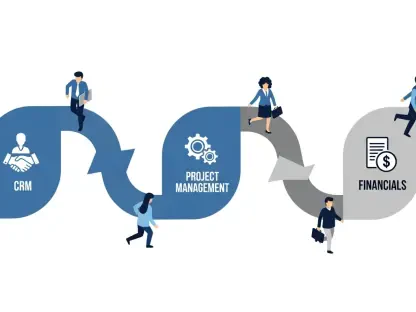Understanding the ERP Landscape and AI Integration
Imagine a world where financial operations, once bogged down by manual processes and human error, are transformed into seamless, automated workflows with near-perfect accuracy. This is the promise of modern enterprise resource planning (ERP) systems, a cornerstone of business efficiency that integrates various functions like finance, supply chain, and human resources into a unified platform. The ERP industry has become indispensable for organizations aiming to streamline operations, especially in finance, where precision and speed are paramount. Today, the market is dominated by legacy giants, yet it stands at a critical juncture as digital transformation reshapes expectations for what these systems can achieve.
The current ERP landscape is characterized by a handful of major players who have long dictated standards, offering comprehensive solutions to manage resources across industries. However, the integration of artificial intelligence (AI) is emerging as a game-changing force, enhancing capabilities beyond traditional data processing to predictive analytics and automation. AI’s influence is redefining how ERP systems handle complex financial tasks, pushing the boundaries of efficiency and insight. This shift aligns with a broader trend of digital transformation, where businesses are compelled to adopt cutting-edge technologies to remain competitive in a rapidly evolving global economy.
Digital transformation is no longer an option but a necessity for modern enterprises seeking agility and scalability. AI’s role as a key driver in this evolution cannot be overstated, as it introduces intelligent automation that minimizes manual intervention and accelerates decision-making. By embedding AI into ERP functionalities, companies can unlock real-time insights and optimize resource allocation, setting a new benchmark for operational excellence. This convergence of AI and ERP signals a transformative era, particularly in finance, where the potential for innovation is vast and largely untapped.
DualEntry’s Breakthrough: Funding and Innovation
Unpacking the $100M Investment Milestone
In a striking development for the ERP sector, DualEntry has emerged from stealth mode with a staggering $100 million in funding, including a notable $90 million Series A round. Backed by prominent investors such as Lightspeed Venture Partners and Khosla Ventures, this financial milestone underscores a strong vote of confidence in the company’s vision to revolutionize financial management through AI-native solutions. The substantial backing positions DualEntry as a formidable challenger to entrenched legacy providers who have long dominated the market.
This investment is not merely a financial boost but a reflection of the industry’s belief in the potential of AI to disrupt traditional ERP models. The capital is earmarked for enhancing the platform’s technological capabilities and expanding its market presence, signaling DualEntry’s intent to capture a significant share of the growing demand for innovative solutions. Such strategic allocation of resources highlights the company’s ambition to address critical inefficiencies that have plagued conventional systems for decades.
The involvement of high-profile venture capital firms also points to a broader shift in investor priorities toward technologies that promise to redefine business operations. DualEntry’s emergence with such robust support suggests that the market is ripe for disruption, particularly in areas where speed and automation can deliver measurable value. This funding milestone serves as a catalyst for the company to accelerate its mission of transforming financial processes on a global scale.
AI-Driven ERP: Trends and Market Impact
The ERP sector is witnessing a seismic shift with the integration of AI, a trend that is reshaping how financial tasks are managed and executed. Automation of processes like general ledger management and audit controls is becoming increasingly prevalent, driven by the need to reduce errors and enhance productivity. DualEntry’s platform exemplifies this trend, boasting the ability to process $100 billion in journal entries through AI while offering real-time data management via live bank connections.
Consumer demands are evolving rapidly, with businesses prioritizing speed and scalability in their operational tools. DualEntry addresses these needs head-on, providing solutions that can be deployed in as little as 24 hours, a stark contrast to the lengthy implementation timelines of traditional systems. Market data further supports this momentum, revealing that over one-third of middle-market companies have already adopted AI for critical functions, indicating a fertile ground for AI-driven ERP solutions to flourish.
Looking ahead, the growth trajectory of AI-integrated ERP systems appears promising, with forecasts suggesting widespread adoption across industries from the current year to 2027. This expansion is fueled by the tangible benefits of automation, such as cost savings and improved decision-making, which resonate with enterprises of all sizes. DualEntry’s innovative approach positions it at the forefront of this wave, potentially setting new standards for what businesses expect from their ERP investments.
Challenges in Revolutionizing ERP with AI
The journey to integrate AI into ERP systems is not without significant hurdles, as technological complexities pose a formidable barrier to seamless adoption. Developing AI algorithms that can effectively interpret and process diverse financial data requires substantial expertise and resources, a challenge that DualEntry must navigate to maintain its competitive edge. Additionally, integrating these advanced systems with existing legacy infrastructure often proves cumbersome, creating friction for organizations accustomed to older frameworks.
Market dynamics further complicate the landscape, as established ERP giants wield considerable influence and customer loyalty, presenting stiff competition for newcomers like DualEntry. To counter this, the company may need to focus on niche markets or offer unparalleled value through customization and superior customer support. Building strategic partnerships and demonstrating clear return on investment will be crucial in convincing traditional businesses to embrace a paradigm shift toward AI-driven solutions.
Beyond technical and competitive challenges, user adoption remains a critical concern, as resistance to change can hinder the implementation of innovative tools. Ensuring system reliability and providing comprehensive training programs are essential steps to facilitate a smooth transition for end-users. DualEntry must prioritize user experience and ongoing support to build trust and drive widespread acceptance of its platform among skeptical or change-averse organizations.
Regulatory and Compliance Considerations in AI-ERP Adoption
Navigating the regulatory landscape is a pivotal aspect of deploying AI-driven ERP systems, given the stringent requirements surrounding data privacy and financial reporting. Laws such as the General Data Protection Regulation and various national cybersecurity mandates impose strict guidelines on how sensitive information is handled, directly impacting the design and functionality of platforms like DualEntry’s. Compliance with these regulations is non-negotiable for maintaining credibility and avoiding legal repercussions in an increasingly scrutinized digital environment.
The development of AI tools within ERP systems must account for adherence to financial reporting standards, ensuring that automated processes align with accepted accounting principles. This necessitates a delicate balance between innovation and regulatory obligations, as any misstep could undermine trust in the technology. DualEntry faces the task of embedding compliance mechanisms into its platform to safeguard against potential violations while still delivering cutting-edge capabilities to its clients.
Security remains a paramount concern, as the automation of financial data processing heightens the risk of breaches and unauthorized access. Robust cybersecurity measures are imperative to protect sensitive information and maintain stakeholder confidence in AI-driven systems. By prioritizing encryption, access controls, and regular audits, DualEntry can reinforce the integrity of its platform, addressing one of the most pressing challenges in the adoption of advanced ERP technologies.
The Future of Finance: AI-ERP as a Game-Changer
Envisioning the long-term impact of AI-driven ERP systems reveals a future where operational efficiency in finance reaches unprecedented levels, potentially establishing these technologies as the industry norm. DualEntry’s innovations could pave the way for a complete overhaul of how financial processes are managed, shifting the focus from manual oversight to strategic analysis enabled by intelligent automation. This transformation promises to free up valuable resources, allowing finance teams to prioritize high-level decision-making over routine tasks.
Several factors could influence this trajectory, including further advancements in AI capabilities that enhance predictive modeling and anomaly detection within ERP systems. Evolving business needs, such as the demand for global scalability, alongside economic fluctuations, may also shape the adoption curve of these technologies. DualEntry’s ability to adapt to such disruptors will be critical in sustaining its relevance and impact across diverse market segments.
Catering to a wide range of enterprises, from mid-market firms to companies preparing for public listings, DualEntry stands to play a pivotal role in driving innovation within the finance sector. Its platform’s emphasis on rapid deployment and high automation addresses the unique challenges faced by businesses at different growth stages. As a frontrunner in this space, the company is well-positioned to influence industry standards and inspire a wave of technological progress that redefines financial management.
Conclusion
Reflecting on DualEntry’s remarkable journey, it becomes evident that the $100 million funding and AI-driven ERP platform mark a turning point for financial management tools. The transformative benefits of high automation, error reduction, and swift deployment stand out as key achievements that distinguish the company in a crowded field. These advancements challenge the status quo, offering a glimpse into a more efficient and responsive approach to enterprise resource planning.
Looking ahead, businesses and investors are encouraged to closely monitor this evolving space for emerging opportunities and potential collaborations with innovators like DualEntry. Exploring pilot programs or strategic alliances could provide a practical pathway to test and integrate AI-driven solutions into existing workflows. Such proactive steps promise to position organizations at the forefront of technological adoption, ensuring they remain agile in a competitive landscape.
Ultimately, the focus shifts to fostering an environment of continuous learning and adaptation, where embracing cutting-edge ERP systems becomes a strategic imperative. DualEntry’s contributions highlight the importance of staying attuned to industry shifts and leveraging partnerships to amplify impact. By prioritizing innovation and scalability, stakeholders can navigate the complexities of modern finance with confidence, building on the foundation laid by pioneering companies in this dynamic sector.









